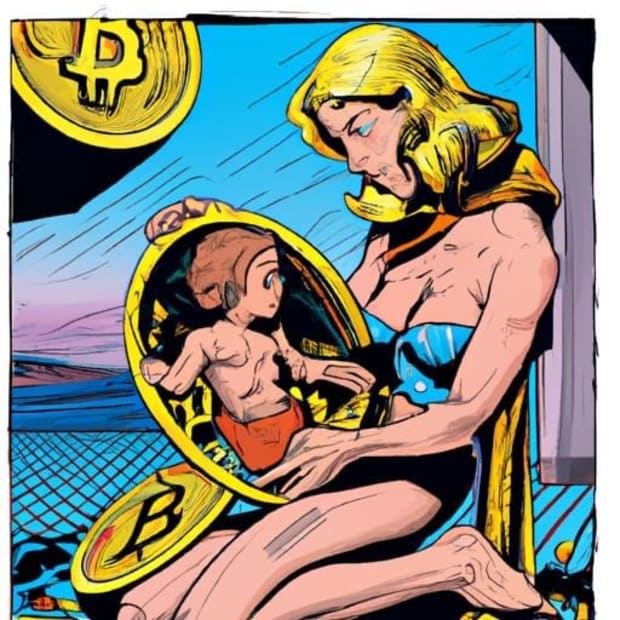[ad_1]
“I’ve gained a lot of sovereignty through … Bitcoin, and I’m equally grateful that my partner has done the same by choosing home birth.”

This is an opinion editorial by Conor Chepenik, an organizer for the Mass Adoption Bitcoin meetup and the father of a child who was born at home.
When my partner initially mentioned a home birth for our first child, I didn’t give it much thought. As a man, I had limited knowledge of what childbirth entailed. For my whole life, it seemed like common knowledge that giving birth in the hospital is just what you do because it’s “safe.” Luckily, my partner didn’t trust common knowledge, she went and verified for herself.
Did you know that in 2021, cesarean deliveries accounted for 32.1% of live births in the United States? I was taken aback when I learned that. One third of women were not having natural births in one of the wealthiest countries in the world?
I also learned that inducing women early is common practice in a hospital. It is usually done when there is a concern for the mother’s or baby’s health, but elective labor induction is also often performed for convenience. Labor induction carries various risks, including failed induction, low fetal heart rate, infection, uterine rupture and increased bleeding after delivery.
Furthermore, epidurals containing fentanyl have been known to cause difficulties in babies latching on to their mothers’ breasts. This is not meant to bash on hospitals. It’s to point out that women’s bodies have been able to birth babies long before humans created hospitals.
At first, a home birth seemed like a neat idea to me because it would mean that I got to watch my child enter this world from the comfort of my living room. But after learning about these statistics, my mindset quickly shifted to home birthing being not just interesting, but our best option.
Now, you might be wondering why an essay in Bitcoin Magazine is discussing childbirth. The answer is simple: Bitcoin, like home birth, is rooted in the idea of trusting oneself and one’s own abilities. Bitcoin is a decentralized, digital currency that enables secure and private transactions without intermediaries such as banks or governments. Saving in bitcoin is a way of trusting in your own ability to manage your financial assets.
There is no way you will be able to go through with a home birth or save in bitcoin if you have not put in the time, research and willingness to verify the value of these things. It’s important to make informed decisions that align with your values and preferences, as not everyone is suited for home birth or for Bitcoin.
Avoid Fear-Based Decision Making

Just because someone in a position of authority recommends a particular course of action, it doesn’t necessarily mean that it is the right choice for you. Fear-based decision making should be avoided at all costs. Home birthing can be scary, just as keeping a large part of your wealth in bitcoin can be. Empowering individuals, rather than fear mongering them, will help people make decisions that are in their best interests.
For example, some doctors may recommend a hospital birth and some bankers may recommend keeping your money in a bank due to the perceived safety and security of those institutions. Don’t accept this without verifying for yourself. Everyone is different, which means it’s important to weigh the potential benefits and drawbacks of each option.
While hospital births may offer access to advanced medical equipment and professionals, they also carry a higher risk of medical intervention and complications. Similarly, while banks may offer convenience and the perception of safety, they also carry the risk of loss due to inflation or bank failures. As we’ve seen with the collapse of Silvergate, Silicon Valley Bank (SVB) and Signature Bank, it doesn’t take much for a bank run to happen in our digital world.
Sure the Federal Reserve, U.S. Treasury, and Federal Deposit Insurance Corporation (FDIC) just announced that the FDIC would bail our SVB’s depositors, but what these financial experts are not disclosing is that this means that inflation is going to rip again as they print money to make these depositors whole again.
With this announcement, you can probably rest assured that most deposits at any bank in the U.S will be guaranteed in the case of a bank failure. Unfortunately, the dollars in that bank account are going to lose purchasing power everytime they create more of them out of thin air. Dilution is a simple concept. For those who don’t get it, Thomas Massie did a great job explaining it in this video around the three-minute mark. By taking the time to educate yourself and make informed decisions, you can maintain your autonomy and make choices that are actually in your best interest.
Another reason that people argue that you should keep your money in a bank instead of in bitcoin is because, with bitcoin, you have no recourse to recoup your funds if you mess something up. This is correct. You are responsible for your UTXOs, full stop. If you fat finger a Bitcoin transaction, there is no bank to call and tell to freeze that transaction. This is the trade off you face when holding your private keys. With more freedom comes more responsibility.
Bitcoin and home birthing are not for the weak and dependent. I’m proud of my partner for choosing a home birth, and our happy and healthy baby is a testament to the benefits of trusting one’s body. While there are undoubtedly instances where doctors and banks have saved lives and money, respectively, both rely on trusting a third party. Being sovereign means taking independent action and minimizing outside interference.
Living With Tradeoffs
Of course, there are tradeoffs with everything. I’ve lost bitcoin due to my own stupidity, and I’m sure there are horror stories out there of people losing their children due to lack of medical care. Still, I can only speak from anecdotal evidence, but I believe there is immense value in being as sovereign as possible. It’s unfortunate to see banks fail and mothers get hurt because of the current system we have. However, I don’t think most of the people in these systems are evil; they are just inside of corrupt systems.
If you are willing and able, there is value in holding your own bitcoin and giving birth at home. If you are really sovereign, you might even consider free birthing, which means giving birth without any medical help. My partner had a midwife, and that was amazing. I’m so glad we had someone to guide us for our first child.
That reminded me of someone who takes self custody of their bitcoin but relies on someone else’s node, like those who might use Muun wallet. Yes, you are relying on someone else’s server to send and receive your bitcoin. If you can, you should run your own node and be fully sovereign. That said, if you are just getting started down the Bitcoin rabbit hole, the first step is often simply getting your coins off of an exchange. If you don’t take self custody, you are no better than someone with all of their funds in a bank — or arguably worse, because crypto exchanges don’t get FDIC insurance.
You can always learn to run a node once you become more experienced. Similarly, having a midwife to help with your home birth might make sense for a first child. Not everyone is ready to give birth without any medical help, and relying on someone with more experience can be super valuable. That is what my partner opted for, and even though it was not as sovereign an option as free birthing, we still had an incredible experience.
In the same way that I wouldn’t recommend that my grandpa run a Bitcoin node, my partner wouldn’t suggest that her friends having their first children give birth alone. It’s crucial to weigh your options, do the research, and make informed decisions that work for your individual situation. Personally, I’ve gained a lot of sovereignty through my experience with Bitcoin, and I’m equally grateful that my partner has done the same by choosing home birth. I believe that there are valuable lessons to be learned from both communities, as they both prioritize autonomy and self reliance. Bitcoiners recognize the importance of being in control of their financial assets, while home birthers prioritize taking ownership of their childbirth experiences and trusting in their bodies’ natural abilities. By understanding and embracing these values, we can create more empowered and self-sufficient communities.
No Easy Solutions
In life there are no easy solutions. Every decision we make comes with a set of tradeoffs, and it’s our responsibility to consider them all rather than outsourcing that to an “expert.” Though the concepts of Bitcoin and home birth may seem vastly different, they share a common goal — ensuring the success of future generations.
This is a promising sign for the future, as these children will become the leaders and decision makers of our society. Regardless of their parents’ beliefs or values, they will inherit a world that is constantly evolving, and they will have the power to shape it in ways we cannot yet envision.We can’t give them the right answers, but we can teach future generations how to weigh their options and trust themselves, not others, to make the right decisions.

This is a guest post by Conor Chepenik. Opinions expressed are entirely their own and do not necessarily reflect those of BTC Inc or Bitcoin Magazine.
[ad_2]
Source link
My NEO Group:
– White paper My NEO Group: https://myneo.org
– Discover NEO X: https://docs.myneo.org/products/in-development/neo-x
– Disccover NEO Dash: https://myneodash.com
– Discover Banca NEO: https://bancaneo.org
– Interview of the CEO of My NEO Group, Mickael Mosse, in Forbes: https://forbesbaltics.com/en/money/article/mickael-mosse-affirms-commitment-to-redefining-online-banking-with-bancaneo






